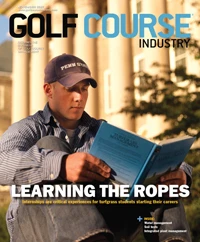In its raw form, the Peter Principle states simply that systems (i.e., golf associations) tend to develop up to their management’s collective level of competence, after which incompetence prevails.
Some might look at the Peter Principle as a statement of pessimism and negativity when, in fact, it’s not. First and foremost, it’s based on the constructive premise that the principle only applies to people and/or organizations that have committed to realizing stated goals and have moved well down the road to realizing these goals. However, because every human being has personal limitations, so too must their collective leadership teams. The Peter Principle doesn’t apply to the lazy, indifferent or the inadequate.
Therefore, when I say the CMAA, GCSAA and PGA have reached their Peter Principle levels collectively and separately, I’m also freely acknowledging these associations’ dedicated pursuits of excellence through their developing years to the near present time. However, life is life, and the lay board members and professional staffs that serve these associations, as presently constituted, have advanced these associations as far as they can go. It’s one thing to manage an association during its formative years when there were fewer members, only a few million dollars of revenue and modest educational responsibilities, but it’s quite another to manage an association once it matures with performance objectives of more than 25 million members, $25 million of annual revenues, highly sophisticated educational requirements and a responsibility to elevate a profession.
The insidious characteristic of the Peter Principle is that it approaches stealthy and delivers its knockout blow without anyone being the wiser. Consequently, board and staff members continue on their ways believing they’re still managing their associations on level playing fields, when in fact the landscape has changed dramatically – to the point where these associations inexplicably have stagnated without anyone knowing it. The impact the Peter Principle will continue to have on these associations in the future will be devastating if left unchecked because:
- Well intentioned CMAA, GCSAA and PGA boards of directors, being transient in nature and sensing they’re no longer able to stay on top of issues as they once were, increasingly surrender their operational policy determining roles to staffs, not seeking control, but always willing to accept it.
- Furthermore, once staffs assume control of operations (not necessarily all policy matters), the associations’ future development potential quickly becomes limited to their staffs’ ability to generate new programming. However, because staff members aren’t hired for this purpose and therefore lack the necessary vision and skills, new program development and the future growth of these member-based associations become terminally limited.
Extensive talks with CMAA, GCSAA and PGA veteran core members confirm these two premises and provide further the insight that core association members are quite displeased: (i) that the board members they elect to do a job turn this responsibility over so easily to staff members that don’t have the prerequisite experience to develop the cutting-edge programming that members require to advance careers and their professions; and (ii) that these staffs aren’t being held accountable for their actions by the association boards or general memberships.
Freeing the CMAA, GCSAA and PGA from the clutches of the Peter Principle, while addressable tasks, will require vision, commitment and patience because the goals to be realized are both simplistic and complex. For example:
- The more immediately realizable objectives are those affecting staff performance because change can be effected here with immediate direct action. To accomplish this change, the following commitments would be needed: (i) that the present association boards of directors begin to recognize that operational control of their associations has been transferred to staffs some years ago and accordingly they must commit to reacquire this control (i.e., boards set policy, staffs implement policy); (ii) that definitive job descriptions that would hold c.e.o.s and all staff department heads accountable for specific assignments are carefully prepared and put in place; and (iii) that association staffs be expanded to include an experienced program development component to insure that recommended new programming will have the opportunity to be developed on merit and flow through to the memberships.
- The more difficult, time-consuming challenges to address are those directly affecting board performance because it’s always more difficult to effect change at the top of the organizational chain. Basically, until these association boards understand the need to bring private sector expertise to their policy-making forums, their associations will continue simply treading water.
Two high-profile examples where private sector expertise is helping to guide golf organizations to sustained success are The First Tee and the USGA. These two golf organizations succeed because individuals with proven, private-sector experience have been integrated into their leadership teams. (See my September 2005 column.)
If present club managers, golf course superintendents and golf professionals want to leave vibrant growing membership associations their children and grandchildren will respect – and some will consider establishing careers within – the lessons of the Peter Principle must be learned hard and fast now. GCI
Jim McLoughlin is the founder of TMG Golf (www.TMGgolfcounsel.com), a golf course development and consulting firm, and is a former executive director of the GCSAA. He can be reached at golfguide@adelphia.net or 760-804-7339. His previous columns can be found on www.golfcourseindustry.com.

Explore the November 2007 Issue
Check out more from this issue and find your next story to read.
Latest from Golf Course Industry
- The Cabot Collection announces move into course management
- Carolinas GCSA raises nearly $300,000 for research
- Advanced Turf Solutions’ Scott Lund expands role
- South Carolina’s Tidewater Golf Club completes renovation project
- SePRO to host webinar on plant growth regulators
- Turfco introduces riding applicator
- From the publisher’s pen: The golf guilt trip
- Bob Farren lands Carolinas GCSA highest honor






